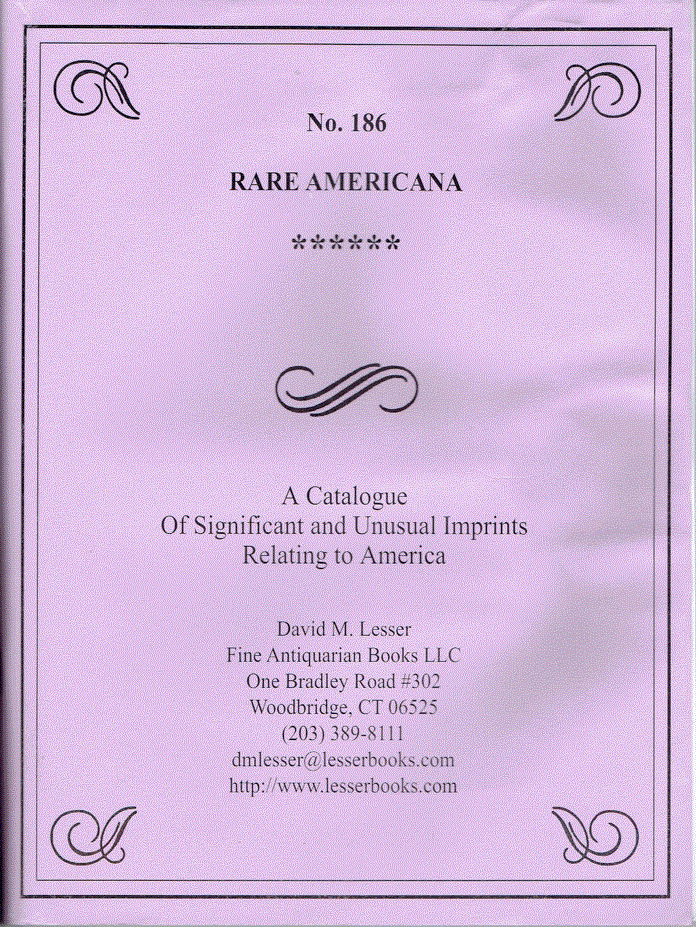David M. Lesser Fine Antiquarian Books has issued a new catalogue, no. 186, of Rare Americana. As always, these are filled with fascinating material relating to America (with an occasional exception) with many pamphlets, broadsides, and manuscripts in the collection. Here are a few of these items.
We begin with a report compiled in Britain for the year 1841 but it had too much relevance to America. Its title is Correspondence with Foreign Powers Relative to the Slave Trade. By 1841, England had not only abolished slavery in all its territories, it also used its navy to prevent others from sending new slaves captured in Africa to lands where it was still permitted. America also outlawed the slave trade, but slavery was still permitted in the country which might encourage their illegal importation. This report provides details on vessels used in the slave trade, their captains, flags, and number of slaves transported. It is filled with diplomatic exchanges concerning the trade with the West Indies, Brazil, Cuba, and Central America. It also has material on Britain's treaty with Texas, then in its independent republic days, and slavers trading under the American flag. Item 1. Priced at $650.
Most people have supported usury laws to prevent the charging of exorbitant interest on loans. Even Adam Smith, capitalist par excellence, favored this restriction on the free market. Not Jeremy Bentham. Bentham wasn't a heartless capitalist. He was a philosopher, the primary supporter of utilitarianism. This philosophy determines right and wrong actions based on which bring about the most good for the most people. Evidently, he felt making more loans available was better for mankind than restricting the amount of interest charged. His views are supported by the credit card companies, payday lenders, and the Mafia. He explains his position in A Defence of Usury; Shewing the Impolicy of Present Legal Restraints on the Terms of Pecuniary Bargains. To Which is Added, a Letter to Adam Smith, Esq. LL. D. on the Discouragement of Inventive Industry. This is the first American edition, published in 1796. $1,750.
Here is a military you probably have not heard about. It wasn't really an army, despite its name – the Cold Water Army. It was a temperance group aimed at children. It was based on the belief that if you get to children soon enough, you can convince them never to touch the stuff. Item 78 is a pledge certificate children could sign pledging themselves to a life of temperance (we have no statistics as to how many lived up to that pledge as adults). It reads National Cold Water Army. Health – Peace – Competence. Pledge. This certifies that …..... has subscribed to the above pledge. The pledge begins, “Here Lord! I pledge to hate / To all that can intoxicate / I'll never use the filthy weed / Then from its evils I'll be freed.” The pledge is from 1842. The “Cold Water” comes from the group's preferred drink - cold water. Item 78. $450.
This was a novel court case and transportation in America would be very different today had the verdict gone the other way. From 1858, this is what is known as the Albany Bridge Case. A New York State statute authorized the building of a bridge across the Hudson River at Albany. The law was challenged by some boat owners who feared the bridge would interfere with their ability to navigate the river. The question was whether the state could authorize bridges over a waterway since this might affect interstate commerce, which was the federal government's sole prerogative under the Constitution. Item 2 is The Power of the States to Bridge Their Navigable Waters. Argument of Nicholas Hill, in the Albany Bridge Case, Before the United States Circuit Court. He argued that the state did have the power to build bridges over navigable waters. The Circuit Court agreed that unless the federal government enacted legislation prohibiting it, a state could erect bridges. The plaintiff appealed the ruling but the judges on the Supreme Court split 3-3. On a tie vote, the ruling of the lower court is upheld so Albany was free to build a bridge. Item 2. $275.
This is an 1861 cartoon print of The Hercules of the Union. Hercules has a club labeled “Liberty and Union” as he strikes the seven-headed dragon. The heads are those of Confederate leaders. The club-wielding Hercules is Gen. Winfield Scott, the Commanding General of the U.S. Army. Depicting Scott as Hercules was a bit ironic. By this time, he was 75-years-old, grossly obese, probably over 300 lbs., and could no longer mount a horse, barely walk. Scott resigned later that year as Lincoln had turned to others for advice on handling the war. Not that Lincoln always made the best decisions either. He selected George McClellan as Winfield's successor, who was a mediocre general and became Lincoln's opponent in the 1864 presidential election after Lincoln fired him. Item 18. $1,500.
David M. Lesser Fine Antiquarian Books may be reached at 203-389-8111 or dmlesser@lesserbooks.com. Their website is www.lesserbooks.com.









